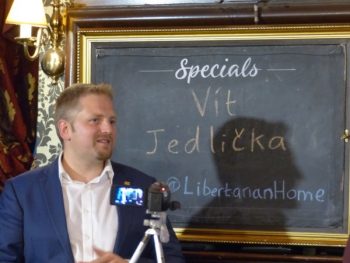Last night I attended Libertarian Home’s first Thursday of the month meeting, at which the speaker was Vít Jedlička:
Jedlička is a libertarian politician. Maybe you think that’s a contradiction, but if we libertarians are to score any victories out there in the big wide world, we must have such people, and the very least we can do is listen to what they say, and, assuming we like the approximate sound of it, we should back them up and beat ours drums for them, even as we nitpick about details, tactics, principles, etc.
I did zero homework for this meeting, and have done extremely little since, so many of those reading this will know a lot more about this man than I do. All I can now offer is a few thoughts about how he came across to me last night, and about what he definitely is – but also probably is not – achieving.
Jedlička is trying to establish a small country, called Liberland. He has found a small chink in the armour of the state system, in the form of a small, unclaimed patch of territory between Serbia and Croatia. He and his collaborators have moved into it, and have declared it to be a state.
Jedlička is careful to call what is happening out there in Liberland a minimal rather than non-existent state. After all, if only to defend itself against the rest of the state system, most notably the state of Croatia, Liberland needs something very like a state apparatus itself. There’s a lot of ducking and weaving going on.
Jedlička struck me as a guy who, unlike some libertarians I could mention, including some who have become involved in schemes for new libertarian countries, well understands the difference between how the world ought to be, and how it actually is. When asked how he planned to stop this or that attack on Liberland, he did not descend into libertarian rant-mode about how such attacks would be wicked. Of course they’d be wicked. That wasn’t the question. Instead, he frankly acknowledged that this enterprise may not work. He presented it as very much a load-fire-take-aim, fear-the-worst-and-try-to-prepare-for-it but hope-for-the-best sort of an enterprise.
Why then, the air of breezy optimism that Jedlička exuded all evening? Why the sense that at least something was definitely being accomplished, even if Liberland itself soon or eventually gets snuffed out? One word answer: publicity.
Media people love a story. “Bunch of libertarians talking about libertarianism in a pub” is not much of a story, unless, like me, you particularly like that kind of thing. But: “Bunch of libertarians sets up a libertarian country, and hopes to make it survive against all the odds.” That’s a story. That is a “narrative”, of the sort that attracts attention, and television cameras, even if it’s only to see what happens when the snuffing out bit starts to get seriously organised by the world’s snuffing out tendency. Jedlička himself is very aware of all this. He knows that his main impact on history is likely to be lots of people hearing about libertarian ideas and some of them becoming libertarians, not that Liberland itself will necessarily get very far. But, as he says, you never know. And you definitely never know if you never even try.
So, the sad probability that Liberland will perish, soon or eventually, if only because all that publicity is liable sooner or later to attract entirely the wrong kind of attention, doesn’t mean that what Vít Jedlička and others with similar schemes are doing around the world should be discouraged. Yes, each libertarian tadpole of this sort faces bad odds. But the way to get libertarian frogs hopping about in the world is to give birth to as many libertarian tadpoles as we can. If the number of libertarians in the world keeps on increasing, as it is increasing, and if the intellectual self-confidence of those opposing libertarianism continues to fall, as I think it has been falling throughout my lifetime, then sooner or later, some of these tadpoles are going to become frogs. Some of them will even survive for a while, and procreate. Then the amount of libertarian publicity in the world will turn from a trickle into a tsunami, and the age of libertarianism may then get seriously under way.
Meanwhile, the way that actually doing libertarian things encourages libertarian discussion about doing more things had its effect on last night’s proceedings. The upstairs pub room in which Libertarian Home’s meetings happen, usually only about two thirds full, was, last night, packed out.
Vít Jedlička, being the publicist and politician that he is, suggested a big group photo at the end of the formal proceedings, which duly materialised, and which I duly joined in on, as a photographer, this being the least worst of my snaps at this point:
One of my technically less successful snaps of the same scene included no less than five other snappers in the foreground, the intended point being that I was absolutely not the only snapper present, and that by now, news of this event and of what was said at it and of how many people showed up at it, will already have travelled quite far, and quite wide.
I have been attending libertarian pub meetings, and other and bigger libertarian gatherings in London, for more than half of my life. Simon Gibbs, who organised this Libertarian Home meeting, often says that I “know everybody”, by which he means that I know every libertarian in London. Well, I do know a lot of London libertarians, but I definitely don’t know all of them, and this was proved to me with particular force last night. Aside from a very few familiar faces, such as Simon Gibbs himself at the back there, with his face in shadow next to where it says “Specials”, I knew almost nobody in the above picture. By the time I left I had only become acquainted with a very few of them. This cheered me up a lot.






I don’t suppose anybody taped his talk, did they?
Best of luck to him. Hope he doesn’t end up crushed by a tank.
“As it is increasing”. You wouldn’t happen to have any evidence for that claim handy, would you, Brian? I’d like to see it. My own impression is that people are abandoning libertarianism like rats deserting a sinking ship.
And libertarianism is a sinking ship. Look at that photo. Almost entirely white people. (I know that at least one brown face is only there because her husband is, and I suspect that the youngish girl on the right is there with her boyfriend). That’s pretty odd given London is the world’s most multicultural city, isn’t it? But of course it isn’t odd at all – libertarianism almost exclusively appeals to whites (and Jews). Now white people aren’t having children anymore; we’re a tiny, and shrinking, percentage of the world’s population, and libertarians can’t even win over enough whites in white majority countries to be taken seriously. What chance will you have in the future? And seeing as the official libertarian position is to cheer on mass immigration, why would thoughtful, politically engaged young white men take you more seriously than they do now a few years down the road? You are finished. You are done.
Hmm, I wonder why does Rocco choose to classify people by the color of their skin (aside from Jews, who apparently are not “white”, but still not…whatever), and not by the size of their ears or the length of hairs in their noses?
(I hope no one here is seriously compelled to answer these questions seriously).
Rocco, you vanished up your rear end the moment you used the phrase “official libertarian position”. Can you point me to who establishes these official positions? No, of course you can’t. Hans-Hermann Hoppe school libertarians actually take the opposite view, so you seem rather confused. Not being a HHH fan, I am indeed in favour of open borders, but first I am in favour of all the things that make that feasible (such as the end of the welfare state and laws that abridge free association in the name of preventing “discrimination”).
Libertarianism has actually won so many arguments that libertarian positions are so mainstream they are not thought of as libertarian. But they are. I have never supported the idea of a Libertarian Party anywhere. Is there a Classical Liberal Party? Not that I know of. My view of libertarianism is it an approach, a philosophy, a way of seeing the world that countervails the one that places state at the centre of everything, and that is all it is in my view.
But the reason I am going to kick you from this site, dick head, is not your arguments but because you are insulting some perfectly pukka libertarian women. Ciao.
Yes, that was the dead give away.
Is this the same Rocco who used to have a gravatar? Somehow i doubt it.
Anyway, it is simply not true that libertarianism only appeals to White people. Just look at Hong Kong, Singapore, Mauritius, the Emirates, Jordan — at least when it comes to economic freedom. (I could also mention Chile, but i am not sure how White it is.)
In principle, i agree. In practice, however, i have come to think that open borders are incompatible with the things that make open borders feasible. (A paradox, not a contradiction.)
About the OP i can only say that it is a worthwhile initiative. I might consider moving to such a place if it takes off. I must look deeper into the Liberland website.
A Croatian invasion is not a danger if the Croatians accept that they have more to gain than to lose.
Dear Rocco – Brazil has a large free market movement that has emerged in opposition to the statist economic policies that have ruined the country. The movement is “racially” mixed.
As for the United States – who do you prefer, Walter Williams and Thomas Swell or the white Mrs Clinton?
Now let us get back on topic.
I wish these people in the Balkans good luck.
They will need it.
Another way to establish a Libertarian country is to ‘invade’ an existing one! If freedom-lovers emigrate to a small-population country (I.e. Australia and/or New Zealand) then those countries could be freer than the rest of the world. And both those countries are surrounded by seas, and so can dictate who enters the country. No fear of invasion.
Singapore? Hong Kong? Libertarianism? Maybe very limited aspects of it.
Have you lost touch with reality? As skeptical as I am, I’m probably just about the only liberty sympathiser in the various circles I mix in.
Most people, especially in Singapore, worship the state. And why wouldn’t they, given its successes?
Libertarian doesn’t mean anarchist.